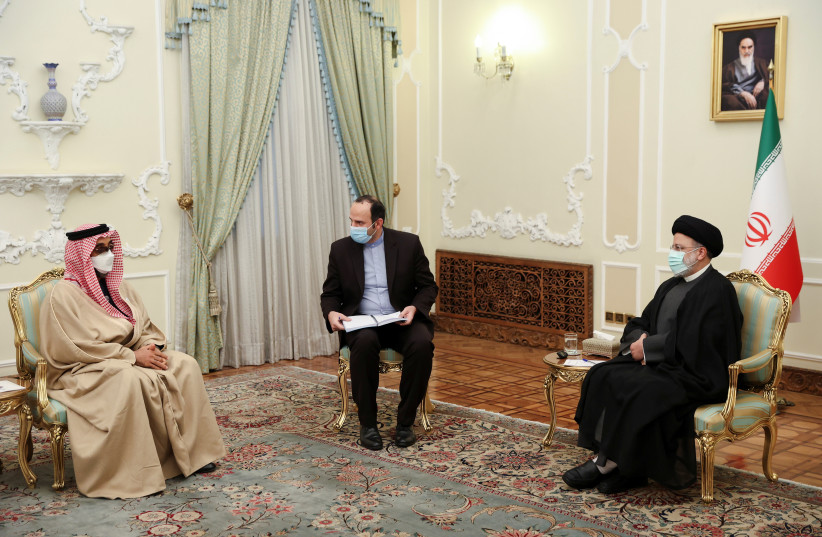Iran reaches out to UAE, Qatar while fueling Hamas – analysis
Iran has been reaching out to the United Arab Emirates and Qatar while continuing to host Hamas and promote terrorism in the region.
On Thursday Iran’s foreign minister Hossein Amir-Abdollahian met with the UAE’s President Sheikh Mohamed Bin Zayed Al Nahyan. At the same time Ali Bagheri, the deputy foreign minister held talks with a Qatari counterpart, Iranian media reported.
The two meetings appear to represent Iran’s growing outreach to the Gulf and how it is positioning itself in the region to take advantage of the new diplomatic era and also to continue to destabilize countries and threaten Israel.
Iran’s Fars News said that Ali Bagheri met with the Qataris and discussed regional “peace and stability.” The two put out generalized statements about these issues, without elaborating on how Qatar and Iran’s partnership is growing or what they propose to do next.
The countries have long worked closely together. At the same Bagheri, who is also seen as Iran’s key nuclear negotiator held a “serious and constructive” meeting with European Union mediator Enrique Mora in Qatar, according to reports in Turkish and other media.
![Iran's President Ebrahim Raisi meets with UAE's top national security adviser Sheikh Tahnoon bin Zayed Al Nahyan in Tehran, Iran, December 6, 2021. (credit: MAJID ASGARIPOUR/WANA (WEST ASIA NEWS AGENCY) VIA REUTERS) Iran's President Ebrahim Raisi meets with UAE's top national security adviser Sheikh Tahnoon bin Zayed Al Nahyan in Tehran, Iran, December 6, 2021. (credit: MAJID ASGARIPOUR/WANA (WEST ASIA NEWS AGENCY) VIA REUTERS)]() Iran’s President Ebrahim Raisi meets with UAE’s top national security adviser Sheikh Tahnoon bin Zayed Al Nahyan in Tehran, Iran, December 6, 2021. (credit: MAJID ASGARIPOUR/WANA (WEST ASIA NEWS AGENCY) VIA REUTERS)
Iran’s President Ebrahim Raisi meets with UAE’s top national security adviser Sheikh Tahnoon bin Zayed Al Nahyan in Tehran, Iran, December 6, 2021. (credit: MAJID ASGARIPOUR/WANA (WEST ASIA NEWS AGENCY) VIA REUTERS)
 Iran’s President Ebrahim Raisi meets with UAE’s top national security adviser Sheikh Tahnoon bin Zayed Al Nahyan in Tehran, Iran, December 6, 2021. (credit: MAJID ASGARIPOUR/WANA (WEST ASIA NEWS AGENCY) VIA REUTERS)
Iran’s President Ebrahim Raisi meets with UAE’s top national security adviser Sheikh Tahnoon bin Zayed Al Nahyan in Tehran, Iran, December 6, 2021. (credit: MAJID ASGARIPOUR/WANA (WEST ASIA NEWS AGENCY) VIA REUTERS)Ramifications for Israel
“The talks between the two officials came amid a months-long stalemate in talks aimed at the revival of the Joint Comprehensive Plan of Action (JCPOA), commonly known as the Iran nuclear deal,” Anadolu in Turkey reported.
The UAE meeting was reported in Gulf Today and they noted “during the meeting, which took place at Al Shati Palace in Abu Dhabi, the Iranian Foreign Minister conveyed to His Highness the greetings of Ebrahim Raisi, the President of the Islamic Republic of Iran, who expressed his wishes for continued progress and prosperity for the UAE.”
The twin meetings with the UAE and Qatar represent an Iranian full-court press in the Gulf. It comes as Iran also hosted Hamas leader Ismael Haniyeh. Haniyeh met with the Iranian Supreme Leader. This was an important and symbolic meeting. Iran was openly messaging that it supports the attacks on Israeli forces in Jenin.
In the discussion between the Iranian “Supreme Leader” and the Hamas leader the Iranian expressed support not only for continued “resistance” against Israel but also noted key details linked to the attacks on Israeli forces.
For instance Iran clearly paid close attention to the fact that terrorists had targeted Israeli vehicles and the Iranians claimed that Israel had to use air power during the operation.
Ayatollah Khamenei said: Who would have imagined that one day the Palestinian youth in Jenin would be so close to the Zionist forces that they would be forced to use fighter jets to escape from the siege of the young fighters, but this happened a few days ago in Jenin.
According to Iranian pro-regime media “Ayatollah Khamenei said “who would have imagined that one day the Palestinian youth in Jenin would be so close to the Zionist forces that they would be forced to use fighter jets to escape from the siege of the young fighters, but this happened a few days ago in Jenin.”
The overall context then of Iran’s outreach this week was that the country is trying o push forward with discussions with Europe on nuclear issues and it is also trying to showcase ties with Qatar.
At the same time Qatar and the UAE are reopening diplomatic offices. The pattern is that Iran wants to appear legitimate in the Gulf, while it continues to back terrorist groups like Hamas and create instability in terms of Israel.
This has ramifications for further attacks against Israel. The ramifications are such that Iran will continue to try to turn Jenin and cities and towns near it into another version of Gaza, a reality that appears to be emerging in the West Bank. Iran will also continue to try to send rifles and weapons to the West Bank.
In addition it may try to send technological know-how regarding explosives and other means to try to empower terror groups in the West Bank to increase their infrastructure.
Another side of the Iranian plan in the Middle East is to continue to threaten US forces in Iraq. The US has said it is trying to deter Iran. This means that Iran pursues one policy in the Gulf and with Europe, while it pursues an arc of instability across Iraq, Syria, Lebanon and into the West Bank to threaten Israel, the US and others.





Comments are closed.